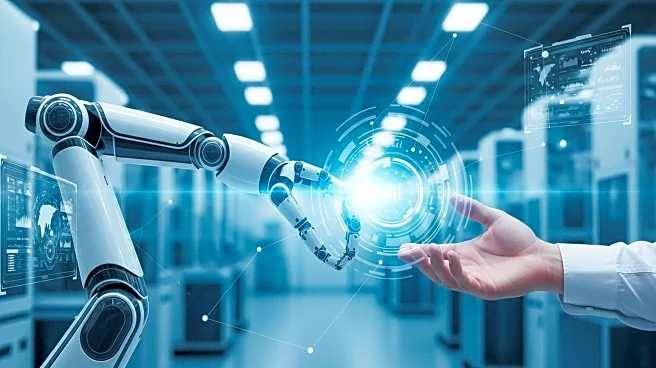What is the story about?
What's Happening?
Walmart CEO Doug McMillon has emphasized the transformative impact of artificial intelligence (AI) on the workforce, stating that AI will change every job within the company. As the world's largest private employer, Walmart employs 2.1 million workers and is preparing for significant shifts in job roles due to AI integration. McMillon assured that there are no plans for sweeping layoffs, with the company's headcount expected to remain stable over the next three years. The changes will occur unevenly, with call centers likely to automate faster than other areas. Walmart is investing heavily in training and partnerships, such as with OpenAI, to equip employees with the necessary skills to adapt to these changes. The company has already implemented automation in warehouses and created new roles like 'agent builders,' while deploying AI chatbots for customer and staff interactions.
Why It's Important?
The integration of AI into Walmart's operations is significant as it reflects broader trends in the U.S. job market, where AI and demographic shifts are reshaping employment landscapes. Walmart's approach, focusing on reskilling and adaptation rather than mass layoffs, sets a precedent for other companies facing similar challenges. By investing in skills training and AI-focused education, Walmart aims to ensure its workforce is prepared for future demands, potentially leading to job growth and new opportunities. This strategy highlights the importance of human skills in conjunction with technological advancements, suggesting that AI can enhance rather than replace human roles. The company's proactive stance may influence other businesses to adopt similar strategies, fostering a workforce that is both tech-savvy and adaptable.
What's Next?
Walmart plans to launch an AI certification program for U.S. employees in 2026, in partnership with OpenAI, as part of its $1 billion investment in skills training. This initiative will be delivered through Walmart Academy, the world's largest private training program, and aims to help associates maximize AI's benefits. The program is designed to support both work and personal growth, aligning with Walmart's broader AI roadmap, which includes the 'super agent' framework and the appointment of Daniel Danker as EVP of AI acceleration. As Walmart continues to integrate AI into its operations, the company is likely to see shifts in job roles and responsibilities, with a focus on creating hybrid roles that combine leadership, community engagement, operations, and technology.
Beyond the Headlines
Walmart's approach to AI integration raises important ethical and cultural considerations. By prioritizing reskilling and adaptation, the company is addressing potential concerns about job displacement and the societal impact of AI. This strategy underscores the importance of balancing technological advancement with human-centric policies, ensuring that employees are not left behind in the transition. The emphasis on human skills and leadership in hybrid roles suggests a cultural shift towards valuing interpersonal and community engagement alongside technical proficiency. As AI continues to evolve, companies like Walmart may play a crucial role in shaping the future of work, where technology and human skills coexist harmoniously.















